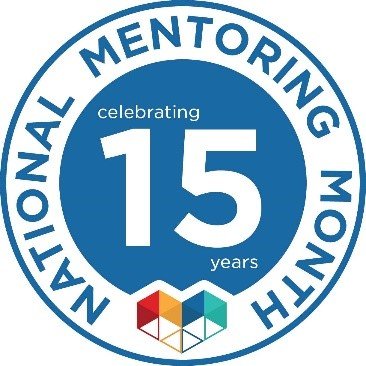Mentoring Matters
 For the past 15 years, by Presidential Proclamation, January has been designated National Mentoring Month. You may have seen #MentorIRL across social media in recognition of this year's theme, Mentor In Real Life.
For the past 15 years, by Presidential Proclamation, January has been designated National Mentoring Month. You may have seen #MentorIRL across social media in recognition of this year's theme, Mentor In Real Life.
National Mentoring Month encourages mentors and mentees to reflect on the relationships they have formed and continue to nurture. A mentor is someone who shares his or her work or life experience with someone else, who is known as a mentee. Mentoring relationships positively influence individuals and their communities.
Mentors offer guidance, support, and encouragement to the mentee. They are usually available to help the mentee with academic, career or personal decisions. Some mentors and mentees become friends. My personal story, which follows, highlights this experience.
About Ticket to WorkSocial Security’s Ticket to Work program supports career development for people ages 18 through 64 who receive Social Security disability benefits (SSI or SSDI) and want to work. The Ticket program is free and voluntary. It helps people with disabilities move toward financial independence and connects them with the services and support they need to succeed in the workforce. Learn MoreTo learn more about Ticket to Work, visit www.ssa.gov/work/ and contact the Ticket to Work Help Line at 1-866-968-7842 (Voice) or 1-866-833-2967 (TTY)Monday through Friday, 8:00 a.m. to 8:00 p.m. ET. Ask a representative to send you a list of service providers or find providers on your own with the Ticket to Work Find Help tool. |
Mentoring Benefits Youth
Having a mentor can be a critical part of young people's lives. It can help them make decisions that lead to improved opportunities and connections, especially with respect to employment. We know that students with mentors tend to have a better understanding of the connection between school and work. Having a mentor offers them first-hand exposure to the workplace and the ability to see themselves as employees at some point in the future.
Young people with mentors also tend to perform better in school. Mentorship improves their attitudes, attendance, behavior and grades. Young people who have mentors also tend to have better relationships with their parents, teachers and peers. They have higher self-esteem and more often plan to continue their education after high school.
Mentoring relationships provide valuable support to young people, especially those with disabilities. In addition to academic and career guidance, mentors can be excellent role models for leadership, interpersonal relationship and problem-solving skills.
My Mentoring Story
I have taken part in many activities on Disability Mentoring Day, a national effort coordinated by the American Association of People with Disabilities. Last year, I decided to step up my involvement and joined the Rising Leaders Mentoring Program. This program is a six-month career-mentoring program run by the U.S. Business Leadership Network (USBLN). The program connects college students and recent graduates with disabilities with business professionals from USBLN partner companies. Mentees have access to mentors with expertise in their fields of study or areas of interest.
During the program, my mentee, a graduate student pursuing his MBA, and I spoke every week. Our conversations followed an action plan that included such topics as:
- Developing soft skills for the workplace
- Disability disclosure and job accommodations
- Writing resumes and cover letters
- Finding internship opportunities
- Searching for a job
- Job interviews
- Understanding disability etiquette
We also conducted mock interviews and met after real ones to identify areas for improvement.
It's been a rewarding experience for me. Though his formal mentorship experience has ended, my mentee and I are continuing our mentoring relationship. I have also applied to mentor a new Rising Leader participant in the coming year.
Additional Resources
- Serve.gov will help you find volunteer opportunities in your community or create your own opportunities.
- MENTOR connects you to mentoring opportunities and identifies tools to support mentoring programs.
- The Martin Luther King, Jr. Day of Service website will help you honor mentors in your community, recruit new mentors, provide training to mentoring programs or encourage mentor pairs to serve together on MLK Day.
- NationalService.gov’s Mentoring Toolkit is designed to help mentors, prospective mentors and mentoring program coordinators get the most out of mentoring.
About the Author
Michael Greenberg is part of the Rising Leaders Mentoring Program, a six-month career-mentoring program run by the U.S. Business Leadership Network(USBLN). The program connects college students and recent graduates with disabilities with business professionals from USBLN partner companies.